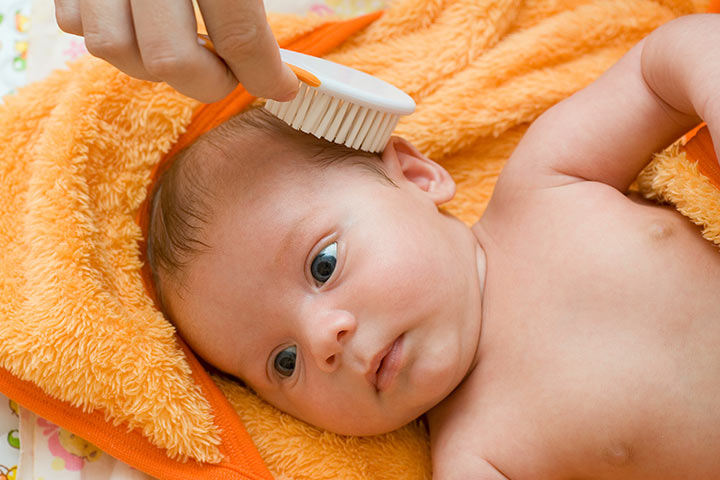Dandruff In Babies: Causes, Symptoms, Treatment And Home Remedies
Image: Shutterstock
In babies, infantile seborrheic dermatitis (cradle cap) and dandruff are of types of the same disease that affects the seborrheic parts of the body. Seborrheic dermatitis is a common, chronic (relapsing) form of dermatitis that mainly affects gland-rich regions of the scalp, face, and trunk (1).
Dandruff, on the other hand, is restricted to the scalp (2). Dandruff is much more common in adults than in babies. That said, its treatment and prevention in babies are not difficult provided the cause is understood well. For that, we recommend you consult a pediatrician, especially when your baby’s scalp is extremely itchy.
Keep reading this MomJunction post to understand the causes of dandruff in babies and the ways to treat it.
Signs And Symptoms Of Baby Dandruff
There are several signs and symptoms that could indicate dandruff. However, common symptoms are (2) (3):
Causes For Dandruff In Babies
The exact cause of dandruff is unknown. However, it is believed that it is a result of multiple factors like genetics, the yeast that naturally lives on the skin, irritants, chemicals, dry and cold weather, and overproduction of sebum (1). Out of the many, the most prevalent causes are:
The main causes of dandruff in babies include overproduction of sebum or skin oil, or overgrowth of a fungus called Malassezia, which may cause the skin cells on the scalp to shed quickly. In this case, you may notice gray or white flakes on your baby’s head (4).
When To See A Doctor?
Generally, with the use of some home remedies, dandruff can be treated within a week or so. But in case you see that the dandruff is persistent and even worsening, taking pediatric consultation is wise. This is more prudent if your baby’s scalp is showing the following signs:
Are The Scales On Baby’s Head Only Due To Dandruff?
Scales on the baby’s head or body may not be due dandruff always. If the skin on your baby’s scalp is scaling and flaking, it may be due to reasons other than dandruff, such as:
It is important to rule out the cause for flaking to proceed with the right dandruff treatment for babies. Visit your doctor for assistance if you suspect that your little one has dandruff. Do not delay if the baby scratches a lot and has itchy scales, red areas, and oozing in the scalp. This is crucial as the same may indicate an underlying medical, such as a fungal infection.
How To Get Rid Of Baby Dandruff?
Once it is confirmed that your baby has dandruff, follow these steps to get rid of it.
How To Prevent Dandruff In Babies?
Frequently Asked Questions
1. Is dandruff contagious?
Dandruff that causes yellowish or white flaky skin is not dangerous or contagious but can be unsightly and itchy.
2. What is cradle cap? How is it different from dandruff in babies?
The dry, scaly scalp is referred to as cradle cap or infantile seborrheic dermatitis. It is usually common in babies aged more than three months (7). Cradle cap can cause dandruff as the skin flakes off besides showing yellowish crusty patches on the scalp. According to the American Association of Pediatrics, the problem can be outgrown by most babies or can be treated using olive oil as its hydrating properties act as a natural remedy in healing cradle cap.
3. Can anti-dandruff shampoos be used for babies?
The use of over-the-counter anti-dandruff shampoos for babies may not be safe, especially because of their delicate scalp. However, you can use medicated anti-dandruff shampoos for babies post pediatric consultation.
Mild dandruff is manageable at home with simple remedies. However, persistent or severe forms of dandruff might indicate underlying conditions like psoriasis, eczema, and cradle cap that require medical attention. Making a note of the severity of occurrence will help your doctor in understanding the little one’s situation promptly. Remember that your little one deserves a healthy scalp, which could be maintained easily with a home care routine.
Do you know any home remedies for treating and preventing dandruff? If yes, tell us about them in the comments section below.
References:
1. Seborrheic Dermatitis in Children; National Eczema Association
2. Luis J. Borda and Tongyu C. Wikramanayake; Seborrheic Dermatitis and Dandruff: A Comprehensive Review; National Center For Biotechnology Information (2015)
3. Dandruff; National Health Service, UK
4. Seborrheic dermatitis; Medline Plus, U.S National Library of Medicine
5. Cradle cap; Better Health Channel; Victoria State Government
6. Dandruff; Health Service Executive
7. Cradle cap; The Royal Children’s Hospital, Melbourne
2. Luis J. Borda and Tongyu C. Wikramanayake; Seborrheic Dermatitis and Dandruff: A Comprehensive Review; National Center For Biotechnology Information (2015)
3. Dandruff; National Health Service, UK
4. Seborrheic dermatitis; Medline Plus, U.S National Library of Medicine
5. Cradle cap; Better Health Channel; Victoria State Government
6. Dandruff; Health Service Executive
7. Cradle cap; The Royal Children’s Hospital, Melbourne



Leave a Comment